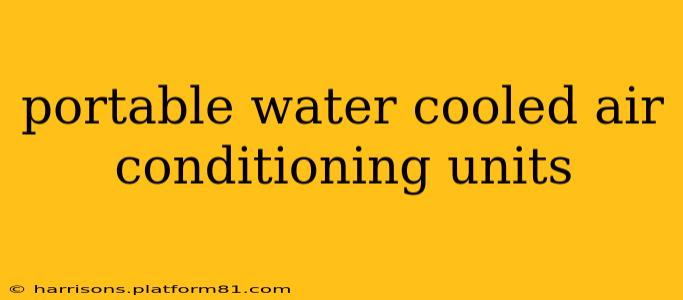The search for effective cooling solutions often leads to portable air conditioners. But what if you need a truly efficient and environmentally friendly option, especially in areas with limited access to traditional power grids or where energy costs are high? Enter portable water-cooled air conditioning units. These innovative systems offer a compelling alternative to traditional refrigerant-based units, boasting significant advantages in terms of energy efficiency and environmental impact. This comprehensive guide explores everything you need to know about portable water-cooled air conditioners, addressing common questions and concerns.
What are Portable Water-Cooled Air Conditioning Units?
Unlike traditional air conditioners that rely on refrigerants to cool the air, portable water-cooled units use water as their primary cooling agent. These systems typically work by evaporating water, which absorbs heat from the surrounding air. This evaporated water is then either expelled or recirculated, depending on the system’s design. The key benefit is significantly reduced energy consumption compared to traditional units and a much smaller environmental footprint, as they don't rely on harmful refrigerants. They are ideal for situations where electricity is limited, costly, or unreliable.
How Do Portable Water-Cooled Air Conditioning Units Work?
The core principle is evaporative cooling. These units typically draw in warm air, pass it over a wetted filter or coil, and then expel the cooled, humidified air. Some models utilize a more advanced process, such as a closed-loop system that recirculates the water, minimizing water consumption. The cooling capacity depends on factors like the ambient temperature, humidity, and the unit's capacity. They are generally more effective in dry climates, where evaporation happens more readily.
What are the Advantages of Portable Water-Cooled Air Conditioning Units?
- Energy Efficiency: These units generally consume significantly less energy than traditional air conditioners, leading to lower operating costs.
- Environmentally Friendly: They avoid the use of harmful refrigerants, contributing to a smaller carbon footprint.
- Water Conservation (some models): Closed-loop systems minimize water waste compared to evaporative coolers that continuously exhaust water.
- Portability: As their name suggests, they are designed for easy transport and setup.
- Cost-Effectiveness (long-term): Although the initial investment might be slightly higher than a basic portable AC unit, the energy savings can quickly offset this.
What are the Disadvantages of Portable Water-Cooled Air Conditioning Units?
- Lower Cooling Capacity: Compared to refrigerant-based systems, their cooling power is generally lower.
- Humidity Increase: The cooling process adds moisture to the air, potentially making the environment feel clammy in humid climates.
- Water Source Required: They require a source of water, either a continuous supply or refilling.
- Maintenance: Regular cleaning and maintenance are crucial to ensure optimal performance and prevent the growth of mold or bacteria.
Are Portable Water-Cooled Air Conditioners Right for Me?
This depends on your specific needs and circumstances. Consider these factors:
- Climate: These units are most effective in dry climates. In humid environments, the increased humidity might offset the cooling benefit.
- Cooling Needs: If you need powerful, rapid cooling, a traditional AC unit might be better. These units are suitable for smaller spaces or supplemental cooling.
- Energy Costs: If energy costs are high, the long-term savings offered by water-cooled units might make them an attractive option.
- Water Availability: Ensure a reliable water source is available.
What is the difference between a portable water-cooled air conditioner and an evaporative cooler?
While both use water for cooling, portable water-cooled air conditioners often incorporate more advanced technologies, such as closed-loop systems for water recirculation and may offer slightly more efficient cooling. Evaporative coolers tend to be simpler and less expensive but generally less efficient and consume more water.
How much do portable water-cooled air conditioning units cost?
The cost varies depending on the size, features, and brand. Expect to pay more than a basic portable air conditioner, but the long-term energy savings can justify the investment.
How efficient are portable water-cooled air conditioning units compared to traditional AC units?
Portable water-cooled units generally boast higher energy efficiency ratings (EER) than traditional AC units. However, their overall cooling capacity is usually lower. The most efficient choice will depend on your specific climate and needs.
Where can I buy a portable water-cooled air conditioning unit?
Many online retailers and specialty stores sell these units. Research different models and compare features, energy efficiency ratings, and prices before making a purchase.
This comprehensive guide aims to clarify the advantages and disadvantages of portable water-cooled air conditioning units, empowering you to make an informed decision about whether this technology suits your specific needs. Remember to always check reviews and compare different models before purchasing.
